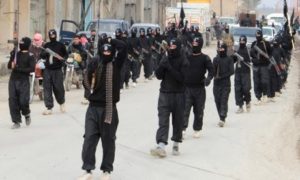
There have been no American forces in Iraq since 2011, when President Obama ordered the last troops to leave. Now the man who lost the presidential race to Obama five years ago is pointing a finger at the president for al-Qaida’s resurgence.
Some 1,300 U.S. troops died in the area during the Iraq War, and Sen. John McCain (R-Ariz.) says the troops that fought there are now left wondering whether it was all in vain.
“Americans were killed in the second battle of Fallujah, 600 wounded, now we see people driving around Fallujah with black flags,” McCain says. “It’s a disgrace.”
McCain contends the total withdrawal of U.S. troops from Iraq left a vacuum that’s being filled by America’s enemies. Obama removed the troops after failing to get a status of forces agreement signed with Iraq that would prevent American service members from being tried in Iraqi courts. McCain says he’s spoken with top Iraqi officials about just who did not want to sign that agreement.
“I know what they said to us, they were ready to sign, and Obama did not want to stay in Iraq, and that’s what it was all about,” he says.
Joining McCain in blasting Obama is South Carolina’s Lindsey Graham, a fellow Republican on the Armed Services Committee.
“If we’d had a residual force of 10- to 12,000, I am totally convinced there would not have been a rise of al-Qaida,” Graham says. “The political process would’ve continued to move forward.”
Virginia Democrat Tim Kaine disagrees.
“They did not want us to stay, and under those circumstances, we couldn’t stay,” Kaine says. Kaine, who chairs the Senate Foreign Relations Committee’s Middle East subcommittee, says at a meeting in Bahrain last month, he discussed the total pullout of U.S. troops with Iraq’s foreign minister, Hoshyar Zebari.
Read the full story at npr.org


